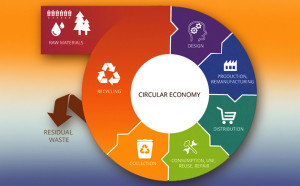The European Commission has recently launched the Circular Economy Package (Circular Economy Package) to promote European competitiveness worldwide, economic growth and employment in full compliance with the environment and its resources.
The package lays the foundations to shift from the current linear model of economic growth to one where the value of products and materials can be maintained as long as possible.
In details, the package includes a global action plan defining some draft pieces of legislation reviewing the European directives on waste currently in force. The review of European directives on waste and landfills is also expected to reinforce the collaboration between Member States to tangibly improve management and also guarantee that structural funds are used to support the objectives of EU legislation on waste and introduce minimum operating conditions for Extended Producer Responsibility.
Separate collection of waste within the context of the circular economy
A Conference promoted by the EU Commission was the occasion to present a Study, commissioned by the Directorate-General for Environment to BiPRO Gmbh and the Copenhagen Resource Institute, which assess the practical implementation of separate waste collection in European countries, with special attention to the performance of European capital cities and proposes a series of conclusions and recommendations targeted to the various levels of waste management decision-making processes (i.e. national, regional and municipal ones).
The survey has highlighted high urban waste recycling rates in the countries where separate waste collection was mandatorily introduced for some fractions of urban waste. The survey has shown that the mechanical biological treatment (MBT) alone can contribute to the attainment of the objectives set by the directive on landfills, yet that it is not enough to reach the 50% recycling goal. Furthermore, the collection of two fractions together (e.g. plastics and metals) is a «reasonable way to reduce costs and maintain a good quality level for the materials», however the presence of several fractions mixed together increases the likelihood of accidental contaminations, lower quality of recyclable materials and high rates of rejected waste. Finally, if separate waste collection of biodegradable waste is carried out door-to-door, the entire fraction of dry recyclable waste also increases.
Greece and Ireland are the only countries where the four waste fractions are collected altogether. At the level of the EU capital cities, seven of them use the PAYT «pay-as-you-throw» model (Berlin, Budapest, Dublin, Helsinki, Lubjiana, Tallinn, and Vienna). In these cities, the average percentage of urban solid waste collected is 35%, while the corresponding percentage in cities where fixed fees are applied is 17%.

